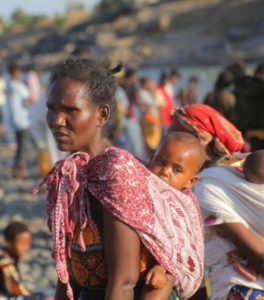Ethiopian dialogue process faces challenges
Ethiopia has launched a national dialogue process aimed at stopping the devastating civil war and bridging the country’s ethnic and political fault lines that have created an 18 month conflict.
A commission established in December has been tasked with overseeing the three-year dialogue process came after government soldiers and allied militia fought off an attack from forces aligned to the Tigray People’s Liberation Front (TPLF) that came within 200 kilometres of capturing the capital, Addis Ababa.
 So far, official statements have been unclear about the aims of the dialogue and what structure it will take. But that government has said it is a process to heal the divisions in a nation of more than 80 ethnolinguistic groups.
So far, official statements have been unclear about the aims of the dialogue and what structure it will take. But that government has said it is a process to heal the divisions in a nation of more than 80 ethnolinguistic groups.
But key rebel groups have not been included in the process and opposition figures are accusing the government of trying to orchestrate the process.
Prime Minister Abiy Ahmed has urged Ethiopians to participate in the dialogue, describing it as a “golden opportunity” that “will allow us to address the political challenges we have been facing for centuries and lay the groundwork for our future”.
The push for a national dialogue has come as the federal government has been locked in a bitter conflict with Tigrayan forces since November 2020.
The fighting has devastated northern Ethiopia and been marked by atrocities committed by all sides, including mass killings, rape and torture.
These incidents exacerbated divisions between ordinary Tigrayans – who make up six million of Ethiopia’s 110 million population – and other groups including the Amhara, Ethiopia’s second-biggest ethnicity.
Tigrayans have also become more supportive of a secessionist movement in Tigray, which has been cut off from the rest of Ethiopia since June, last year.
The United Nations has estimated that 90 percent of the region’s 5.5 million people are in need of urgent humanitarian assistance.
Last year, thousands of Tigrayans were rounded up in a wave of what human rights experts have described as ethnically motivated arrests under a state of emergency imposed as the TPLF-aligned Tigray Defence Forces (TDF) advanced towards Addis Ababa.
Many remain in detention. Meanwhile, both Tigrayan and Amhara activists claim their groups are the victim of “genocide”.
The TPLF, which is the ruling party in Tigray and has been outlawed as a terrorist group, is currently excluded from the national dialogue as is the Oromo Liberation Army (OLA), which operates in Oromia, the largest region of Ethiopia.
The government unilaterally declared an immediate “humanitarian truce” on 24 March, fuelling hopes for peace. The TPLF responded by saying it would observe a “cessation of hostilities” if aid was allowed into Tigray.
But since then only two aid convoys totalling 67 food trucks and four fuel tankers have reached the region. The UN says 100 trucks need to enter every day to feed millions of people facing extreme levels of hunger.












